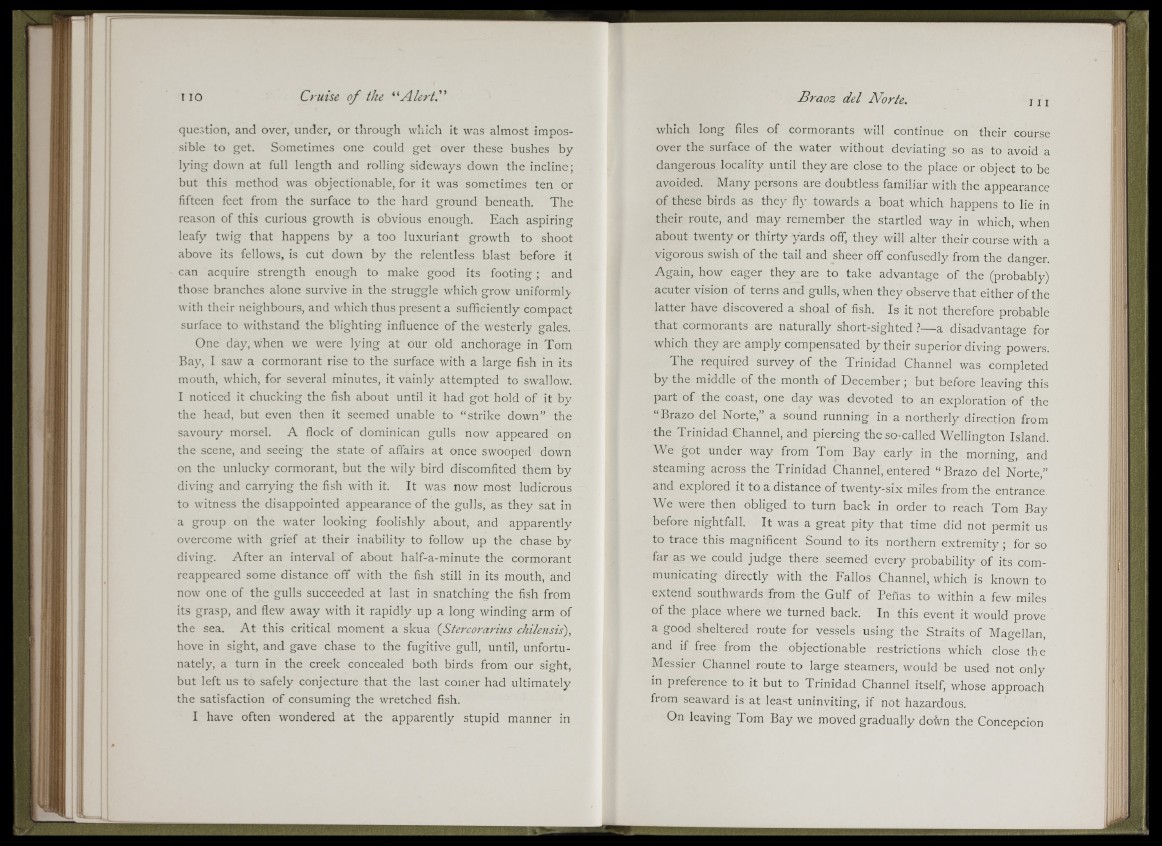
Cruise of ihe “A iert.” Braoz dei Norte.
m
'4 ^
!
i " t ■
Í '
¡If
fii
question, and over, under, or through which it was almost impossible
to get. Sometimes one could get over these bushes by-
lying down at full length and rolling sideways down the incline;
but this method was objectionable, for it was sometimes ten or
fifteen feet from the surface to the hard ground beneath. The
reason of this curious growth is obvious enough. Each aspiring
leafy twig that happens by a too luxuriant growth to shoot
above its fellows, is cut down by the relentless blast before it
can acquire strength enough to make good its footing; and
those branches alone survive in the struggle which grow uniformly
with their neighbours, and which thus present a sufficiently compact
surface to withstand the blighting influence of the westerly gales.
One day, when we were lying at our old anchorage in Tom
Bay, I saw a cormorant rise to the surface with a large fish in its
mouth, which, for several minutes, it vainly attempted to swallow.
I noticed it chucking the fish about until it had got hold of it by
the head, but even then it seemed unable to “ strike down” the
savoury morsel. A flock of dominican gulls now appeared on
the scene, and seeing the state of affairs at once swooped down
on the unlucky cormorant, but the wily- bird discomfited them by
diving and carrying the fish with it. It was now most ludicrous
to witness the disappointed appearance of the gulls, as they sat in
a group on the water looking foolishly about, and apparently
overcome with grief at their inability to follow up the chase by
diving. After an interval of about half-a-minute the cormorant
reappeared some distance off with the fish still in its mouth, and
now one of the gulls succeeded at last in snatching the fish from
its grasp, and flew away with it rapidly up a long winding arm of
the sea. At this critical moment a skua {Stercorarius chilensis),
hove in sight, and gave chase to the fugitive gull, until, unfortunately,
a turn in the creek concealed both birds from our sight,
but left us to safely conjecture that the last coiner had ultimately
the satisfaction of consuming the wretched fish.
I have often wondered at the apparently stupid manner in
which long files of cormorants will continue on their course
over the surface of the water without deviating so as to avoid a
dangerous locality until they are close to the place or object to be
avoided. Many persons are doubtless familiar with the appearance
of these birds as they fly towards a boat which happens to lie in
their route, and may remember the startled way in which, when
about twenty or thirty yards off, they will alter their course with a
vigorous swish of the tail and sheer off confusedly from the danger.
Again, how eager they are to take advantage of the (probably)
acuter vision of terns and gulls, when they observe that either of the
latter have discovered a shoal of fish. Is it not therefore probable
that cormorants are naturally short-sighted .?— a disadvantage for
which they are amply compensated by their superior diving powers.
The required survey of the Trinidad Channel was completed
by the middle of the month of December ; but before leaving this
part of the coast, one day was devoted to an exploration of the
“ Brazo del Norte,” a sound running in a northerly direction from
the Trinidad Channel, and piercing the so-called Wellington Island.
We got under way from Tom Bay early in the morning, and
steaming across the Trinidad Channel, entered “ Brazo del Norte,”
and explored it to a distance of twenty-six miles from the entrance
We were then obliged to turn back in order to reach Tom Bay
before nightfall. It was a great pity that time did not permit us
to trace this magnificent Sound to its northern extremity ; for so
far as we could judge there seemed every probability of its communicating
directly with the Fallos Channel, which is known to
extend southwards from the Gulf of Peñas to within a few miles
of the place where we turned back. In this event it would prove
a good sheltered route for vessels using the Straits of Magellan,
and if free from the objectionable restrictions which close the
Messier Channel route to large steamers, would be used not only
in preference to it but to Trinidad Channel itself, whose approach
from seaward is at least uninviting, if not hazardous.
On leaving Tom Bay we moved gradually down the Concepcion
Ì If